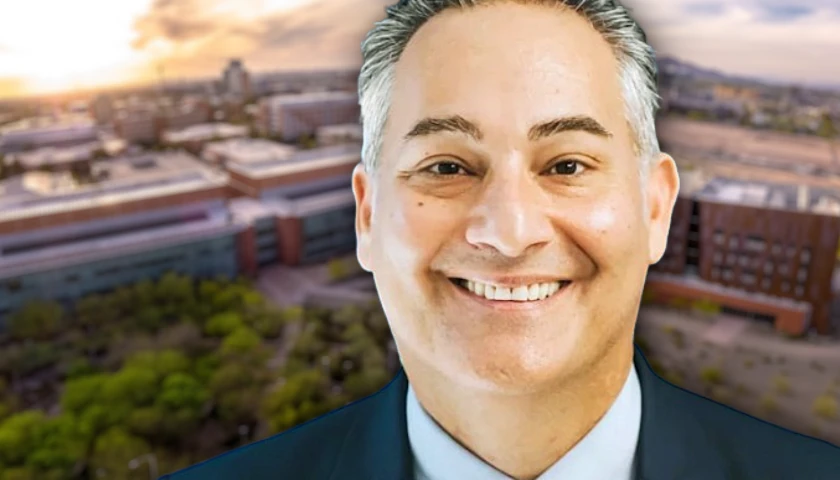by Luke Sprinkel
State Rep. Mary Franson, R-Alexandria, has filed a federal lawsuit seeking to strike down a Minnesota law that can criminalize the sharing of AI-generated election memes.
In 2023, Democrats and Republicans in Minnesota passed a bill, HF 1370, which regulated AI-generated content in Minnesota.
One section of that bill barred Minnesotans from sharing AI-generated deepfakes intended to “influence the result of an election” if those deepfakes are shared within 90 days of an election and done without the consent of the depicted political candidate.
This provision, now codified in state law as Minnesota Statute 607.771, allows the government to fine or jail people in Minnesota who share AI-generated election memes, videos, or parody content in certain situations.
Earlier this year, that elections statute was updated to broaden the window of time in which the sharing of election-related deepfakes is banned. Stiffer penalties were also added in the 2024 update which include forcing a political candidate who breaks this law to forfeit their nomination for the office they are seeking.
In California, Democratic Gov. Gavin Newsom recently authorized a similar law which bans the sharing of AI-generated content that depicts politicians engaging in speech or behavior they did not actually engage in. On Wednesday, a judge granted a preliminary injunction in a lawsuit filed against California’s law, writing that the state has no “license to bulldoze over the longstanding tradition of critique, parody, and satire protected by the First Amendment.”
Free speech advocates have strongly denounced bans on AI-generated political content as an attempt to silence dissent, criminalize criticism of elected officials, outlaw parody, and crush Americans’ First Amendment rights.
As such, Rep. Franson has launched a federal lawsuit to strike down the Minnesota ban on AI-generated political content intended to influence an election. Franson is joined in her lawsuit by Christopher Kohl, an out-of-state online content creator.
The pair are represented by two non-profit, public interest law firms: the Upper Midwest Law Center (UMLC) and the Hamilton Lincoln Law Institute (HLLI). Franson and Kohl contend that the elections deepfake statute “violates First Amendment rights to engage in political speech.”
Months ago, Kohl posted a parody video which lampooned the presidential candidacy of Democratic Vice President Kamala Harris. That video was created with the use of AI-generated technology. Rep. Franson later retweeted a social media post which contained the video.
Under the current law, a simple retweet of a humorous AI-generated parody video could result in disqualification from office, fines, and jail time.
“With the rapid expansion of AI technology, portions of the law are poorly written and could disqualify legislators or candidates from the ballot altogether simply for sharing a meme or other piece of political content,” Rep. Franson told Alpha News. “This represents a dramatic overreach that goes farther than any other law in the country, and must be challenged in court.”
A UMLC press release on the lawsuit says Kohl “earns a livelihood from his content, and Rep. Franson communicates with her constituents and party members on social media. Both hope to continue posting and sharing videos and political memes online, including those created in part with AI.”
While Franson (pictured above) is attempting to get the deepfake elections statute struck down, the GOP lawmaker previously voted for the initial bill, HF 1370, which placed that statute in law.
Like many pieces of legislation, HF 1370 contained multiple provisions. One provision was the ban on sharing AI-generated deepfakes intended to influence an election, and another was a commonsense ban on the sharing of deepfake pornography. The ban on deepfake porn prohibits individuals from sharing videos or images that are manipulated with AI technology to show people engaging in sexual activity.
Rep. Franson told Alpha News that she voted for HF 1370 because of the ban on deepfake porn.
“While I had concerns about political parts of HF 1370, the bill did include restrictions on AI/deepfake pornography that attracted broad bipartisan support,” said Rep. Franson. “Protecting women from nonconsensual deepfake pornography outweighed the concerns I had about the political portion of the bill. My preference would have been that these bills would be brought up separately.”
The lawsuit Rep. Franson has filed seeks only to strike down the statute on AI-generated political content intended to influence an election; her lawsuit will not change or affect the current ban on AI-generated deepfake pornography in any way.
HF 1370 passed in the Minnesota House unanimously. In the Minnesota Senate, only one senator voted against the bill. Gov. Tim Walz signed the bill on May 26, 2023.
“It’s unfortunate that Democrats paired a broadly bipartisan deepfake pornography ban with such a poorly-written bill,” said Rep. Franson. “I’m proud to be partnering with the Hamilton Lincoln Law Institute and Upper Midwest Law Center to make sure this bill gets the legal scrutiny it deserves.”
The 2024 update to the deepfake elections statute, which increased penalties for violating the law, was included in an omnibus elections bill that was passed along party lines; Democrats supported the update, Republicans did not.
– – –
Luke Sprinkel previously worked as a Legislative Assistant at the Minnesota House of Representatives. He grew up as a Missionary Kid (MK) living in England, Thailand, Tanzania, and the Middle East. Luke graduated from Regent University in 2018.








